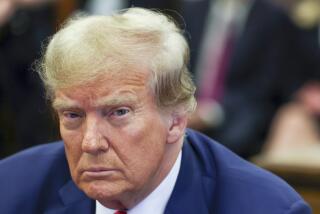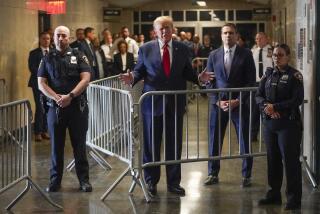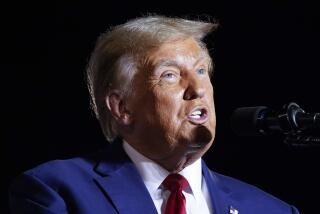Attorneys’ Boycott Stalls Hussein Trial
BAGHDAD — A vow by defense attorneys to boycott the trial of Saddam Hussein and seven of his deputies has begun to bog down one of the most-watched human rights cases in history and threatens to further delay the proceedings.
Lead prosecutor Jaafar Mousawi said Monday that he had tried without luck to draw the defense attorneys to the bargaining table and work out a deal over security worries in time for the trial’s next scheduled session Nov. 28. One defense lawyer, Saadoun Janabi, was kidnapped and killed after the trial’s opening day last month.
Mousawi said in an interview at the Baghdad Convention Center that he had tried telephoning the defense attorneys, but they recognized his staff’s numbers using caller I.D. and “don’t answer the phone calls.”
“We will gather here if they want and see what their demands are,” he said. “We will provide whatever they want.”
Defense attorneys have refused to lift their boycott unless the trial is moved to another country and an international investigation is conducted into the slaying of their colleague.
Under Iraqi law, the court can appoint lawyers to represent Hussein if his don’t show up. But the process can be lengthy, legal experts say, and defense attorneys say the court will find few lawyers in Iraq willing to represent the former Iraqi president because they’ve rallied the entire Iraqi Bar Assn. to their cause.
“My phone is not turned off, and nor do I not answer it,” Khamis Ubaidi, regarded as the lead attorney on Hussein’s defense team, said when told of Mousawi’s phone calls and pleas for cooperation. “Let [Mousawi] call me and I will tell him the decision to boycott has been made by the entire Iraqi legal community.”
The first of what may be several trials against Hussein stems from the imprisonment, torture, banishment and execution of Shiite Muslim villagers from the hamlet of Dujayl after a 1982 assassination attempt on the president.
Lead Judge Rizgar Mohammed Amin convened the trial Oct. 19 but adjourned it the same day to give both sides more time to prepare witnesses and evidence.
But little has happened since. The defense team has not even picked up new copies of documents it loudly complained were illegible in court, Mousawi said.
Defense attorneys have also rebuffed offers of Iraqi police protection, saying the security forces are infiltrated by pro-Iranian militias, and refused temporary quarters in the U.S.-protected Green Zone in Baghdad.
“If they move the trial outside Iraq, we will participate,” said Thamer Hamoud Khuzai, an attorney representing Taha Yassin Ramadan, a former Iraqi vice president, and Barzan Ibrahim Hasan, Hussein’s ailing half-brother.
The deadlock presents the tribunal with its “first great challenge,” said Michael Scharf, a Case Western Reserve University legal scholar who helped train Iraqi jurists for the trials and maintains a Web log about the proceedings. The boycott was a “cunning” move by the defense team, he said in an e-mail.
“It promotes their agenda of getting the Iraqi people and international community to perceive of the tribunal process as unfair,” he said.
Hibba Khaled Mansouri, a Baghdad legal scholar, said the court may be faced with forcing lawyers against their will -- and the defendants’ -- to represent Hussein and his deputies.
“Under Iraqi law he will not be tried without a lawyer,” she said. “If he doesn’t choose one, the court will appoint one for him against his wishes, but this will take weeks.”
Scharf said the court could also order the lawyers to show up in court Nov. 28 or face fines or imprisonment on charges of obstructing justice.
Mousawi said he had prepared an airtight case, including archival film footage of Hussein ordering his security officials to question young men and documents chronicling the former president’s personal involvement in ordering the executions of at least 140 villagers accused in the assassination attempt.
Mousawi urged defense lawyer Ubaidi to quit playing politics with the trial. “I would tell him you have to be careful and be aware of the law and represent your defendant,” he said.
Defense attorneys countered that the trial, from the beginning, has been political theater.
“They are the ones who made this thing political,” Khuzai said. “We want to make this into a normal trial where we can go to court in the morning and go home in the evening.”
More to Read
Sign up for Essential California
The most important California stories and recommendations in your inbox every morning.
You may occasionally receive promotional content from the Los Angeles Times.










